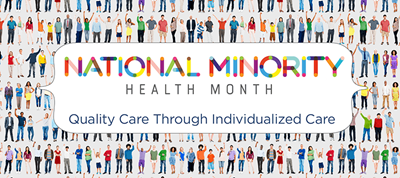Practical Tips to Overcome Cultural Barriers in People with Diabetes
Mar 31, 2021, 15:19 PM

By Oluwaranti Akiyode, PharmD, BCPS, CDCES
April is National Minority Health Month and an important time to reflect on our role in providing truly individualized care. It is important to know that a one size approach does not work to address cultural differences. As diabetes care and education specialists we are aware that differences do exists among cultures (race, ethnicities, age, religious, etc.) that pose barriers to achievement of diabetes therapy goals. The key to ensuring that we have successful engagement with persons we care for is by being culturally sensitive and humble in our journey to cultural competency. I am sure that we all agree that it would be unrealistic to know everything about the culture of all the persons that we care for in our practices.
Well, I have good news. I realize that even in the absence to knowing the details of another culture, there are basic strategies that we can engage with all the persons we care for irrespective of culture. We must remind ourselves that all people across all cultures want to be respected and loved. If we consistently practice the following 7 tips with the attitude of respect and heart of love, we will be able to connect and engage in meaningful ways that would enable us to have improved communications. Ultimately, this would support the development of trust with the persons we care for and contribute to improvement of their diabetes outcomes.
- Tip #1: Avoid use of medical jargon.
- Tip #2: Speak with clarity and slowly.
- Tip #3: Provide short, key messages.
- Tip #4: Use open-ended questioning.
- Tip #5: Use teach-back approach.
- Tip #6: Provide culturally appropriate written communication(language, 3rd grade level, etc).
- Tip #7: Be non-judgmental.
As you can see, the tips are not new to us and are commonly emphasized when addressing other non-cultural patient barriers of care. However, when mixed with respect and love, these tips become critical in the context of cultural differences and would enable us to have improved relationships and overcome cultural barriers in our care of persons with diabetes. Remember, respect and love are universal to all!
Learn more about cultural competency and access other resources at DiabetesEducator.org/NationalMinorityHealthMonth.
ADCES Perspectives on Diabetes Care
The Association of Diabetes Care & Education Specialists Perspectives on Diabetes Care covers diabetes, prediabetes and other cardiometabolic conditions. Not all views expressed reflect the official position of the Association of Diabetes Care & Education Specialists.
Copyright is owned or held by the Association of Diabetes Care & Education Specialists and all rights are reserved. Permission is granted, at no cost and without need for further request, to link to, quote, excerpt or reprint from these stories in any medium as long as no text is altered, and proper attribution is made to the Association of Diabetes Care & Education Specialists.
HEALTHCARE DISCLAIMER: This site and its services do not constitute the practice of medical advice, diagnosis or treatment. Always talk to your diabetes care and education specialist or healthcare provider for diagnosis and treatment, including your specific medical needs. If you have or suspect that you have a medical problem or condition, please contact a qualified health care professional immediately. To find a diabetes care and education specialist near you, visit DiabetesEducator.org/Find.